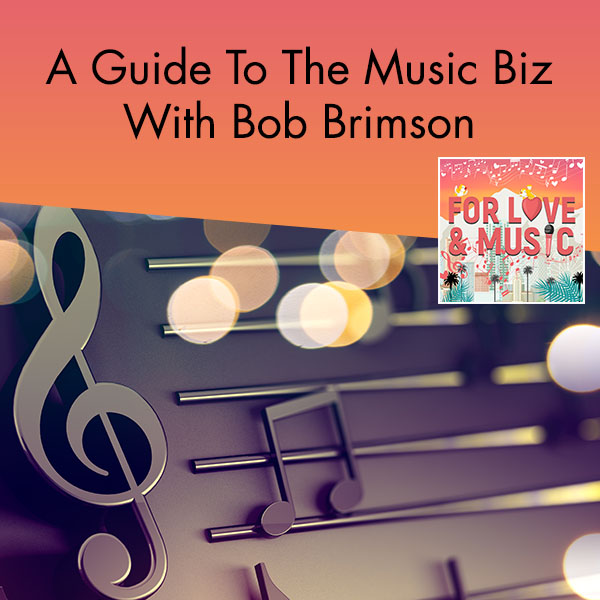
Managing artists is all about understanding talent, taking some care, and helping them have a career rather than making some money quickly and moving on to the next one. Record company executive Bob Brimson was managing successful Brit pop bands for a little label that got bought by BMG and folded into Arista. Today, he shares his knowledge on touring, how to save a buck while touring, and how to guide young artists, and so much more industry knowledge and stories.
—
Listen to the podcast here:
A Guide To The Music Biz With Bob Brimson
I’m very happy because I’m lucky enough to be speaking to someone who was instrumental in helping guide me through my early days in the music industry. Not only did he have the patience of a saint and the knowledge of a genius, but with the advice he gave, it came with so much parent thought that it made my journey all the easier and more enjoyable. With a resume the likes of none other and history at Universal Music UK to rival no other, I’m delighted to introduce to you the fabulous and totally unique Bob Brimson. Bob, how are you?
I’m very well. Thank you very much.
I’m so happy to be chatting with you.
It’s been many years.
I remember I was looking after the Appleton’s when we first met in the early days. They just signed to Polydor and you are incredibly helpful.
You seemed very nice. You asked the right questions.
I always feel that there are no wrong questions. It’s better to have the right answers and to not be too proud to ask than to sit there in total ignorance and I definitely needed to learn.
A lot of managers are not like that. They try to bluff it when things go wrong. You’ve got sensible questions. Most of the time, you wanted to know how record companies work. What’s politics? Why do decisions get made as they did? Those are clever questions to ask. Where’s the power? Who’s actually making the decisions? A lot of managers don’t ask you that stuff. They’ll say, “Give me more money or I want to do this or why are you saying no all the time?”
As a musician, your signature is your most precious possession. Click To TweetI have learned over the past however many years that even though it is about money, it’s not just about money after all. For me, if I worked in that way, I’d probably be richer.
I still think it’s about understanding some talent and taking some care. Try and help them to have a career rather than seemingly make some money quickly and then it’s all over. You were interested in careers for people rather than a quick buck. A lot of managers want the next one for the commission. It’s all they can see and they make bad decisions because of that.
It’s interesting to hear you say that because you’re right, I have always been about the overall picture rather than a quick buck. Tell me how did your relationship with Universal Music UK start? How did it all transpire that you ended up having this 21-year career with them?
I was managing Britpop bands that were reasonably successful, but I wasn’t on in a lot of money. A little label got bought by BMG and folded into Arista. The guy that ran it said, “Stop managing bands and come and work for me and do whatever it is that you do.” He wanted me to be an A&R Director and I hated A&R. I lasted three or four weeks before I decided it was awful. It just wasn’t for me. What I did do because I was a bit bored was when I was a roadie and a manager, it used to infuriate me that record companies didn’t seem to understand what their contracts actually meant. If you talk to one lawyer, they say one thing, what recruitment, who paid for what, where lines were.
I decided to write a manual while I was in Arista and started giving these little fact sheets to people of how things work, what tours are, how you should put them together and contractually what it means. Instead of it being like loads of legal speak, just writing it in plain English. Universal saw it and said, “Can you leave Arista?” which I was happy to do. It’s an awful label. They say, “Come and work for us.” They gave me this little job at Mercury Records. I started doing more and more of that. It’s noble because it turned out everybody wanted to decide what things meant, even the lawyers. It was somebody coming along who wasn’t a lawyer saying, “This is fair and this is a reasonable way of interpreting your contract.” It sounds pretty dry. What it did was he got rid of loads of disputes quickly. Managers would come in and say, “You should be paying for that.” The lawyer would say, “No, we’ve done this and this or something.” All of a sudden, because somebody had written it all down, everybody said, “Let’s go by what this guy says.”
All the labels wanted me to do things like look at all the budgets that came in and decide where they went, whether it was the band paying, whether it was the label paying and what was fair. If there were disputes, they’d ask me to go to speak to the manager and find out what the real problem was and try to find a compromise. There would be new managers and they’d say, “We haven’t done a record deal like this before. Can you go and speak to that manager and see if you can help them through it and making it a smoother process?” That’s how it started. It went from nothing to absolutely huge very quickly.
I presume that people are still working on your guidelines?
Largely, even though I stop doing that particular thing a few years ago. I would say it completely changed a lot of things quite hugely in the touring world. What it did was it forced the beginner managers or experienced managers to do it in a very business-like way. It’s harder to default balance, for example, and ask for money and with no accounting and no responsibility. A lot of money was getting wasted. My father had been signed to Decca.

I didn’t know that. I know he was a legendary folk singer.
He was signed to Decca. In fact, one of my earliest memories of dad and I spent an awful lot of time touring with my dad, was him being dropped by Decca and how devastated he was. I was very aware of that. In the end it’s all about some people who’ve got drained. They want to be a successful musician. If you’re being paid by the record company, I was always very aware that you have to do your best all the time. You have to make it fair. I want it to make it harder for bands to be defrauded so that you force managers into doing things in a business-like way. It also forced people to ask the right questions. If you were going to go and do an American tour for example, let’s work it out properly. Let’s look at the routine properly and make sure that it’s economical and then we’ll make a decision about whether it’s a good business decision for that artist to go to America. It became much easier to decide whether things were a good thing to do.
If there are new artists, new bands and solo artists reading this and they’re reading your words of wisdom, what advice would you give to them for things to look out for when they’re embarking on their new journey in the music industry?
Your signature is your most precious possession. That’s the thing you have to remember if you’re a musician. There are five groups of things that you have to have around you. One of them is going to be your accountant. Your accountant is somebody that will safeguard you, making sure that if you have a career, you will have something left at the end of it and that you will only pay for what you’re supposed to pay for. Be very careful about letting anybody have access to money that you have earned, that it goes into a place that you can control. If you have an accountant and he’s maybe allowed to spend money for you only under certain conditions. Nobody can come along and empty your bank accounts or anything like that. It’s your money. Everybody’s earning money from you. Be very careful about that.
There should be a huge separation between that, in my opinion. Your manager is a separate person who works for you and invoices for their services and for their expenses. You and your accountant will decide if that’s correct and you’ll pay them. If you get those two things right, then the rest of it is down to creative decisions. Your manager’s in the right position to help you make creative decisions. Your agent is in the right decision to help you made correct decisions. The label is getting those things right. A good accountant and a good lawyer are the two things that should be absolute, that’s the car you’re driving. The direction you go in is up to you and your manager. Those things should take a long time to make sure that those people are good and honest people with a good track record. It’s not worth them ripping you off. They’re very experienced in the business and get that right. You’re fairly secure.
Would you say since you started out in the industry that it changed a lot? Did it change for the better or for the worst?
It’s different. It’s much better for artists at the moment. It’s a great time to be a new artist at the moment and because there are also new opportunities that weren’t there before. It’s not as controlled by a small group of people as it used to be. You can’t control social media. If you can’t do that, so many things happen by word of mouth now. That’s exciting. It’s a little bit dryer, more sanitized and more business-like than it used to be. It’s not as many laughs as it used to be. It’s a good time. It went through a bad era for about a decade. It’s around the turn of the century and into the ‘90s. It was Napster and illegal download were killing everybody. Those seem to have gone now and it can be great at the moment.
With regards to your career, what would you say has been your biggest obstacle to date and how did you overcome the challenge?
Be very careful about letting anybody have access to money that you have earned. Click To TweetThe biggest challenge I ever had was being asked after I was doing all this stuff about contracts serving, managers and stuff. They came to me at the end of about 2000. They knew that the internet was coming. They knew that they were going to need a lot more moving images. Videos were costing an extraordinary amount of money. They were made by a very small group of people. It seems to completely have control of it. Various people come along and try to find ways of making it more cost-effective because they knew that unless they found a way of controlling that, it was another thing that was going to kill them. We used to make 100 videos a year at Universals in the UK. It’s near 500 now. It’s huge. That’s including content which runs into the thousands of pieces. We do it at a fraction of the cost that we used to do. I play quite a big part in that. Everybody has been told, “You can’t do anything about it. People have tried it before and not been able to get anywhere.” I was given so complete control over that situation for a while and I won.
You have spent the past twenty odd years overseeing tours, money for tours, videos. Do you have a preference? Did you enjoy one part more than the other or equally in different ways?
They were very different. It was the biggest video operation in the world and the biggest touring operation in the world. You’re doing them both at the same time with two completely different sets of people. It’s a privilege to work with some of those people. They’re the kind of people that could do anything. They happen to be video directors. You get that a lot in video world. They’re incredibly capable people who can do the impossible in a short space of time and make the most incredible things. That was a real privilege to be around. It’s a lot more rock and roll still because it’s a longer thing. It’s much more of a lifestyle. We’re traveling around, having a party every day.
Do you enjoy that?
I did for a time. I enjoy touring and I was a good guitar roadie.
I have to ask you about your days as a guitar roadie with Alison Moyet and Kirsty MacColl, Terence Trent D’Arby. Go on, spill the beans.
I knew you’d ask me because people ask about, “Who’s your favorite artist you’ve ever worked for?” I’ll never think of it like that. There are lots of people I met in all sorts of disciplines. Some of them are managers, video directors or video producers, but they’re all people I admired. I’m glad that I met them. It’s great to stand on the side of the stage when you’ve got thousands of people having a great time. The band is having a great time. The band is making loads of money. You’ve done your job properly so that it’s all working. Nobody’s noticed anything. Nothing’s gone wrong. It’s great fairly and it’s over. That’s the great thing is there is no hangover. The band goes off the stage, they go to the dressing room and it’s finished. It’s not like everything else is like a month later you’re still arguing about invoices and yet you’re arguing with this and that. Touring is great. It’s like Groundhog Day but it finishes every day. It’s a nice feeling. It’s like you’re free every day. I enjoy that.
Tell me, what do you do if you’re working with a big star or massive band and you’re presented with a tall budget where the expenses are off the charts? You’re like, “These people are massive superstars but what they’re trying to spend here or have spent is unacceptable.” How do you deal with that situation?

If you’ve let it go that long, you’re in a bad situation. The thing to do is you have to be a few steps ahead of them. If it’s coming, your best friend is the manager because his fight is your fight. You explain, “Is there a profit margin at the end of the day?” It’s not in their interest to overspend on people. Get a great people by all means but pay them a reasonable rate for what they’re doing. If you can recruit them, I have all sorts of systems, charts and things to say what people should earn in certain situations. What’s reasonable pay for people whether it’s a session musician, a monitor man, lighting designer or whatever. You can tell them what reasonable rates are and to go out and negotiate the rate that’s right for that. The way I control it for the companies is to say, “If you’re within these rates, we’ll support it. If you go above that, that’s your problem and you can pay for it.” It’s in their interest to make it go down a little bit.
For the most part, that method works pretty well. I don’t mind going to warn people about it. I’ll speak to them and tell them that they’re charging too much money and it’s not well. You can have a year’s work if you do this a reasonable deal. If you don’t, then you’re probably going to get replaced off with earning. I can be quite tough. You’re doing it all for the artist. It’s the artist’s money at the end of the day. If you’re going to put something on an artist’s account. If it’s going to be something that they aren’t going to have to pay back from the records law is, you have got a duty and you can’t buy them.
You’re the person between the artist and then being able to buy food one day. You have a duty of care by that person to make sure that if they spend money, they spent wisely. It’s easy to say yes and have an easy day, but it’s not like I’m being paid to be the eyes in that situation. It easy to go to work at that school. I’m not trying to beat somebody up for the sake of it is if they’re going to be reasonable with me, I’ll be reasonable with them. If somebody has taken advantage. No, I’ve got to work. There’s nothing sadder there though, Tara. When you see an artist who’s had a great career and then you find out that they’ve got problems with the IRS.
You unfortunately hear about that quite a lot at the time?
It’s happened forever and it’s better than it’s been for a long time. Some of the old stories are absolutely tragic. You’d go right back into the ‘50s and ‘60s. It’s shocking. This industry we work here and some of them ended up destitute, living on the streets and stuff, and that’s not right. When I was managing, we had a band that didn’t sell great deal of records. They’re running a footnote in Britpop history. They all did write out. Maybe they didn’t thank us for it but I’m pleased that they have somewhere to live at the end of it and they got something out there.
Otherwise, what’s the point?
There’s a point in being, “Look at me, I used to be somebody. Isn’t it great to be a star?”
You want to be able to retire in a bit of comfort if you’ve worked that hard.
A good accountant and a good lawyer are the two things that should be absolute. Click To TweetThere’s nothing sadder than it’s like, “Didn’t you use to be so-and-so?” If you’re remotely responsible for that, you should be ashamed of yourselves. You have to be at sleep at night and think that you did the best by your artists. I can’t buy a slacker even inside the record label or outside the record label or somebody that’s not taking care of business. That’s when you’ll see the worst of me.
I trusted back in the day everything you had to say to me because I’d been an agent at William Morris representing successful actors and TV hosts or presenters. All of a sudden, I found myself in the music industry with these two big stars at the time with Nicole and Natalie Appleton, who asked me to manage them because I had been their acting TV agent. They’d asked me to manage them because they trusted me and they believe that I would fight for them. Knowing though that I didn’t have a music industry background and I was like, “These girls believe in me. I believe in them. I’m going to give this a go.” It was because of people like you and the support that you gave that made me into the manager that I am now.
Knowing how record companies actually work, it is 5% of the job. This is why with every skill that you actually needed to manage an artist successfully, there were some nuts and bolts stuff you didn’t know. You didn’t understand that the politics of a record label, every record company’s different anyway. It was just steering you through it.
It was in that instance, I remember walking into London records. In a way I was terrified, but at the same time ignorance was bliss because I went in there and I asked for what I wanted. I continue to push and push until I got what I wanted. I was introduced to David Joseph who was the MD at Polydor at the time and got them reassigned there. Literally, it was ignorance with bliss because I didn’t have all of the nuts and bolts knowledge that you’re talking about. I got some of the middle stuff out and went for what I needed and it worked in mine and their favor.
I guarantee you David Joseph would have made the same decision I made. It would either recognize somebody but our bet should be good. I know loads of managers, they know the records business inside out. I wouldn’t want to manage me if I was an artist. It’s about how are you going to carry yourself? Are you going to do it with care and attention? Are you always going to be at the end of the phone? Are you going to be somebody that we can work with, that we can have a proper grownup discussion with? You understand about management, you understood about managing some big celebrities at the time. Why wouldn’t you be any good?
I was having this very conversation with a woman that phoned me up. She was asking me for some advice because some friends of hers have got all this attention more for some record labels. I was saying to her, “Why don’t you do it? Why are you talking to me about what managers you can go to, you’ve got every skill that you need to do this? I can tell you the rest of the stuff but they won’t find a better manager than you because you’ve been their friend.” She’d known the girl in question who was trying to be signed since she was five. The connections that she’s got in different disciplines inside the music industry, give her everything she needs to know. “What are you doing? Why are you saying what management companies should they be going to? Because you think you’re being your friend, the best thing you can do is managing yourself. You’ll be fantastic.”
She’s lucky to have you on the side as I was. Let me ask you something else. The show is called For Love and Music. I have to throw a little bit of love in. I’ve got to ask you a little bit of love, a question I asked most people on this show and some people go, “What does that mean?” It’s, “Has love ever guided you to make an unexpected decision in your career?”
I quit working for Terence Trent D’Arby when I was 29. I’ve done three years of 24/7. He did not let up. It was not in my first marriage. The thing was, I’m on my third marriage now, so that plainly didn’t work. I did make that decision of like it’s Terence or my marriage. I’ve got to keep that.

We all reach a point in our lives where love comes first.
I do think you pay a price. I’ve paid quite a hefty price for being so 24/7. I’m on my third effectively fourth marriage.
What does that mean your third effectively fourth?
I was with another lady for a very long time. We weren’t married.
Is there a song that particularly resonates with you romantically?
I’m a very big fan of an American band long gone now called Little Feat. They had a singer called Lowell George, he’s my musical hero. My son is actually called Lowell off to Lowell George. He wrote a song called Long Distance Love which is a bit country and it’s a bit cheesy. There’s a line in it where he goes, “I wonder, does she know? Does she know she hurt me so.” Every time I’ve ever been kicked in the teeth by a woman, I’m right back there. Honestly, I’m sixteen again, being done and heartbroken. Just the way he delivers that line, it’s too much.
I’m going to go off and listen to that song now.
Long Distance Love by Lowell George rather than Little Feat. He made some solo albums.
It's a great time to be a new artist at the moment because there are new opportunities that weren't there before. Click To TweetI’m going to go and listen to that. What’s next for Bob?
I still oversee video for the Universal. I don’t know. They might ring me up and say, “Can you go to New Zealand and do this?”
We want them to say, “Can you come to LA?”
I very nearly knocked on your front door. It just didn’t happen right at the last minute and the other guy went and I thought I was going to fly to Vancouver and I was going to fly down to see you.
That would have been the best surprise ever.
That would have been good. I would love to see you soon.
Thank you so much for taking the time to do this. I appreciate it. You’re the best and anyone out there that got any questions, send them in and I will send them your way, Bob. You’ll probably now get inundated.
I think of myself as a very background person who is not quite not very well-known. I’ve been deliberately catching the background by Universal.
Now, you’re out there through love and music. Thank you and thank you for all. You can catch this episode through our website, LalaLanded.com, through Instagram for updates @LaLaLandedPodcast and also at Facebook at La La Landed.
Important Links:
- Bob Brimson
- Arista
- @LaLaLandedPodcast – Instagram
- La La Landed – Facebook
About Bob Brimson

Having spent 5 years successfuly reinventing Universals live music operations, in 2002 Bob was asked to take on the worlds largest video making operation. Fully aware that costs were on fire and that demand for more and more moving image was going to be needed Universal realised is was vital to get a grip on the costs, politics and business management of videos so that it would be ready for the internet era. 17 years later they make four times as many videos, costs are in check and market share is huge.
The son of legendary folk singer Derek Brimstone, Bob spent his early life on the road as he hated school and left at 15 never to return. However, his first long term job was as a social worker for inner city adolescents with diagnosed behavioural problems. He started playing bass and keyboards in mainly rock/goth bands, but he switched to guitar roadie for the likes of Terence Trent D’Arby, Alison Moyet and Kirsty McColl – spending about a decade on the road as a tech and tour manager. After spells as co-manager of Britpop outfit Echobelly and a short stint with his heroes XTC he took the company shilling as Head of A&R to Arista Records but soon moved to Universal where things really took off. Winning national business awards for introducing plain English to contract guides and best practice – while also becomming the go-to person to help young mangers understand the label system. Bob oversaw thousands of tours and videos over a 20 year period heading up the largest operation of its kind anywhere in the world – only stepping down after the London Olympics in 2012 where he controlled the spending for the opening and closing ceremonies on secondment from Universal. Now semi-retired he mostly enjoys the luxury of listening to what he actually wants to, not what he is working on.
I dont really do social media except for a FB site which is all about Fox Terriers, Brexit and football. I have never ’networked’, had a business card or even a job title. At Arista my role was listed as ‘Head of Bobness’.

